I first heard of Teso University when the vision for it occurred to Pilgrim’s founders several years ago.
Part of my job, as President of the International Board, is to be skeptical.
Me: “So, you want us to start a university in an area of East Africa that has absolutely no record of success in higher education, in which we are barely able to sustain a secondary school, on property we don’t yet have, with money that isn’t there?”
Answer: Yes.
Under such conditions, what can one do but pray?
So I prayed. I prayed through all the years of false starts. I prayed when we got hold of one property only to have it pulled out from under us through political skullduggery. I prayed when we managed to trade our interest in the first property for a second property, only to watch the same thing happen again. I prayed, when all of us were tempted to give up on the whole idea, that God would actually let me give up on the whole idea. And I prayed when it became clear that He would not.
And today I prayed on the top of a mountain in Serere District, thinking that maybe, just maybe, this is the place. Because it seems to be the place. And I want to believe with my whole heart that this is the place.
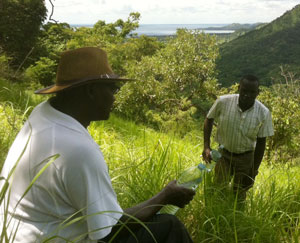
Dr. Mwanika and Pilgrim Africa Education Director Sam Ocen on the way up the mountain
Dr. Andrew Mwanika, our project director for TU, has been chasing the harrowing course of events since 2009. He is exactly the kind of project director I want, who believes passionately in the project, and understands all the reasons why it can’t possibly happen, all at the same time. He put the vision into words when I met him four years ago, as follows: “I have often wondered why there are nearly six thousand Ph.D. agronomists in East Africa, and yet we are unable to feed ourselves. I think the answer is British Certificate Education. We produce Ph.D.s who produce other Ph.D.s and so on. And in the meantime, no one is actually growing food. So this university will offer something completely different. It will be vocationally oriented. It will be organized around service learning. And it will be based in the local communities.” You get the idea? Students learn in the classroom, they go into the communities as a laboratory, and what they hear and see and learn in the communities, feeds back into the classrooms.
We chose three areas to launch from: sustainable rural technologies, teacher training and public health. Against all odds we made proposals for partnership to UMass Amherst and to Columbia University, and against all odds, they accepted our advances. Aquaculture. Sustainable farming. Creative learning. Community health strategies. We wanted to build something that could produce teachers and welders and farm extension agents at the same time as we produced scholars and researchers and educators who would reshape higher education systems across the world. And we wanted it to be based in Teso, the land of the forgotten. If this sounds like something that you have already read, regarding the impossibility of success we faced in establishing Beacon of Hope College, you are an observant reader.
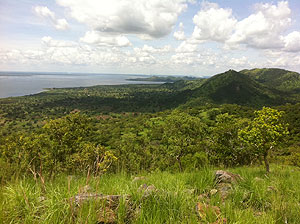
Lake Kyoga, Uganda
Today I saw what may be the most beautiful five hundred acres God ever committed to the hopes of a university. Sometimes you don’t know why He has frustrated your plans in the past, until you come to the place of His provision, and realize your ideas were far too small.
The Bugondo tract lies on the shores of Lake Kyoga. It has abundant water and agricultural land. It is connected through ancient ties of familial relationships to many surrounding villages. It has native granite for building. It also encloses what may be the largest expanse of virgin forest left in the northeast of Uganda.
And it is very nearly ours.
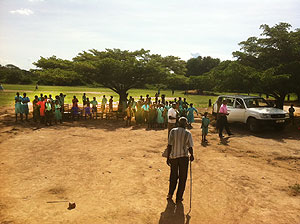
Muzei, age 83, and schoolkids of Teso.
Over the last several months, Dr. Mwanika has painstakingly followed the incredibly complicated process for acquiring a university land grant in Uganda. He has met countless times with local elders and district officials to obtain their buy-in. He has cultivated a winning relationship with the largest local landowner, who has insisted that the tract be awarded to no one else but Pilgrim. And the results have been enormous. When the local MPs, eager for personal gain, went into the villages to collect signatures for petitions opposing Pilgrim’s plan, they were often physically chased back to their cars. A culminating moment came in a local gathering of elders, when Dr. Mwanika was posed this question: “We understand that you promise a better life for our communities, scholarships for our children, and the economic benefits that can come from careful development of this region. But what is in it for us now?”
Controlling his anger, the doctor asked, “Well, tell me what it is you need.” He was expecting, of course, a sum of dollars, a bottom line.
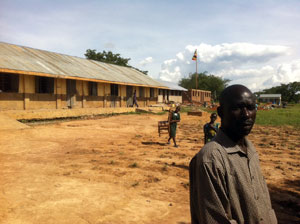
Teacher Abraham with the new roofs for local school classrooms from Pilgrim and government built blocks in the background.
But their answer was different. They said, “We too care about the education of our children. But their school has been crippled by violent weather. The classrooms have no rooms, so they must study in tents outside. And there is no accommodation for their teachers.”
Our good doctor was humbled. He promised there and then that these things would be taken care of. And today I saw that they have been. The school has new corrugated roofs, paid for by Pilgrim, and that has shamed the government into building two additional classroom blocks. And we have created one more set of relationships for the future.
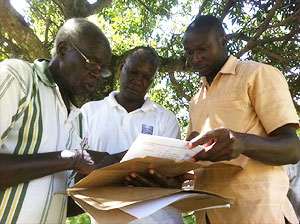
Muzei, Dr. Mwanika, and Land Board attorney going over final paperwork for tomorrow’s hearing.
I met initially today with the elder whose support and intervention had carried us so far, to introduce myself and to express my thanks. Muzei is 83 years old, a former fisheries officer, and pastor of a church that meets on his property. After reviewing the documents for the Serere District Land Board meeting, which may approve our application tomorrow; he joined us for the first part of the hike across the bounds of the property. The land board’s chairman served as our guide the whole way.
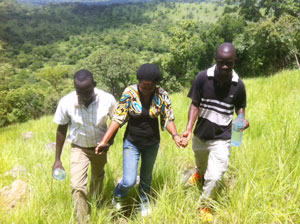
Sam and William give Angella a hand up the mountain in Bugondo.
We travelled up a draw, and slowly climbed the slopes on one side of the valley which we hope will soon be the home of Teso University. Then we went down the hill and crossed to the opposite side, eventually arriving at the peak, overlooking all of Lake Kyoga. It was a stunning sight.
I cannot adequately express the emotion that filled me in that moment. I could not believe we were coming so close to what had seemed an impossible idea. I took in the whole panorama, and my eyes settled on the valley below us. I was told that this was where the rebels had made their headquarters, back in the 90s in one of the many recent wars. And now the friends of Calvin Echodu, our CEO and a former child soldier himself, would be planting here the banner of the Resurrection.
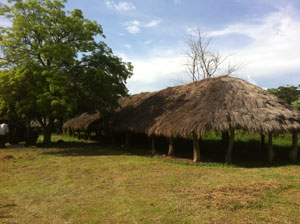
Muzei’s church in Bugondo
So, I prayed: first free form, then the collect for ordinations from the Book of Common Prayer. And then I blessed everything I could see, which amounted to the entire horizon.
